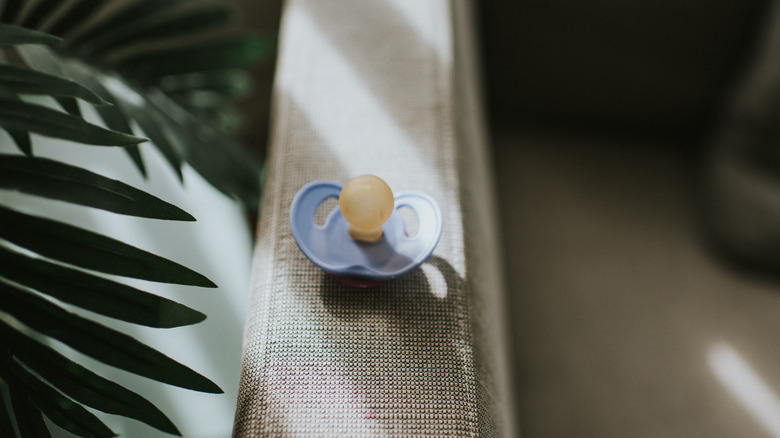Adult Pacifiers Are The Anxiety-Busting Habit That May Be Risky For Your Teeth
In modern society, stress remains an unfortunate reality. Yet it's become alarmingly problematic for Gen Z and Millennials. A 2023 survey from the American Psychological Association found that younger adults are experiencing nearly double the stress of their age 65+ counterparts.
(Read about the serious ways stress can damage your body.)
To cope with their stressors, some people have turned to an unexpected anxiety-busting habit: sucking on adult-sized pacifiers. The trend started in China but, thanks to viral TikTok videos, has gone international. Advocates of the practice claim it helps them relax, stop smoking, and deal with the symptoms of adult attention-deficit hyperactivity disorder (ADHD). Several businesses have responded by designing, manufacturing, and selling adult pacifiers online. (The New York Post noted that prices for the pacifiers vary from a little over a dollar to around $70.) But many dental experts say that sucking on a binky could lead to oral health issues.
One problem involves the potential for the teeth to shift out of place. The sucking forces can lead to an open bite (when the teeth don't come together, even when the mouth is closed); this may require surgical changes to correct both the function and appearance of the teeth and mouth.
Adult pacifier-linked speech disorders
Another concern relates to possible changes in the way the tongue operates in someone who regularly uses an adult pacifier. Orthodontist Dr. Ben Winters warned readers of The New York Post that "you don't want to go into a tongue thrust pattern" from using an adult pacifier.
The tongue thrust pattern is useful in babies because as they thrust their tongues forward (when latching on a human or synthetic nipple, for example), they instinctively swallow. However, it loses its usefulness after babyhood.
Dr. Winters explains that if this reflex returns, it can affect speech or encourage bite misalignment. For instance, some people who have difficulty pronouncing certain common sounds or words may have a tongue thrust reflex that never went away. Consequently, they might need to undergo speech therapy to be able to speak clearly. His conclusion? "I would not make it a habit to keep something like this in your mouth at all times."
Potential transference of germs
There's a third potential pitfall to pacifiers: They can get germy, which means you might wind up introducing bacteria into your body every time you use one.
The average pacifier is basically a germ magnet, according to a study presented at the 2012 American Society for Clinical Pathology Annual Meeting. The study, which was conducted at Oklahoma State University, examined the surfaces of 10 pacifiers and determined they were contaminated with multiple types of bacteria strains, including some that were linked to the development of infectious diseases.
Accordingly, if you're going to give this trend a taste test, always practice sound hygiene to avoid illness. Speaking to Cleveland Clinic, pediatrician Dr. Jason Sherman offered a simple tip to appropriately remove lingering nasties from dirty pacifiers: "[W]henever you can, give pacifiers a quick rinse with soap and water." (Read about the right way to clean your baby's pacifier if it falls on the ground.)


